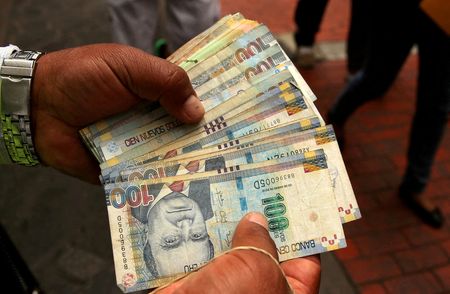By Marco Aquino
LIMA (Reuters) – Peru lowered its economic growth forecasts for 2023 and 2024 on Tuesday amid poor weather, lower private investment in mining, and anti-government protests earlier this year.
The South American country’s economy is expected to grow 1.1% this year, the economy ministry said in Peru’s official gazette. That is down from a previous estimate of 2.5%, after data showed the economy shrank in the first half of 2023.
That would mark the slowest annual growth since 2009, excluding coronavirus-dampened 2020. The Peruvian Fiscal Council warned the forecast could still be too optimistic and could see further adjustments.
Next year, Peru’s economy is expected to grow 3.0%, the ministry added, down from a previous estimate of 3.4%.
The world’s second-largest copper producer has taken a hit as prices of the metal fell from an average of $400/lb last year to an estimated $380/lb this year and $360/lb next year.
Though metals mining and production is expected to grow 7% this year, private investment – largely in mining – is expected to drop 4.5%, alongside a slowdown in Peru’s construction and manufacturing sectors.
Peru’s fishing industry is also expected to be seriously hit by warmer seas due to the El Nino climate phenomenon, the ministry said. This has devastated production of the anchovy-based fertilizer fishmeal in which Peru leads globally.
Warmer seas are also expected to bring heavy rains along the Pacific Ocean coastline, likely damaging agriculture and key infrastructure such as roads. That makes El Nino the largest immediate threat to Peru’s economy, the government said.
The ministry also pegged Peru’s estimated fiscal deficit for this year at 2.4% of gross domestic product (GDP), up from the 1.7% of GDP recorded last year.
Meanwhile, Peru’s estimated current account deficit was lowered to 1.6% of GDP, down from the 2.1% of GDP previously expected.
Still, markets appeared largely unfazed. Peruvian stocks in dollars were up 1.16% in early afternoon trading.
Finance Minister Alex Contreras, in a press conference on Tuesday, vowed that the government was working “intensely” to reverse the trend, and that inflation was slowing, with the annual rate set to dip to 4% by year’s end.
He added that companies from multiple countries including the U.S had shown interest in developing petrochemicals in Peru.
The government has repeatedly denied the country entered a recession after the two consecutive quarterly contractions this year, citing methodological nuances.
(Reporting by Marco Aquino; Writing by Kylie Madry and Isabel Woodford; Editing by David Holmes, Alistair Bell and Bill Berkrot)


